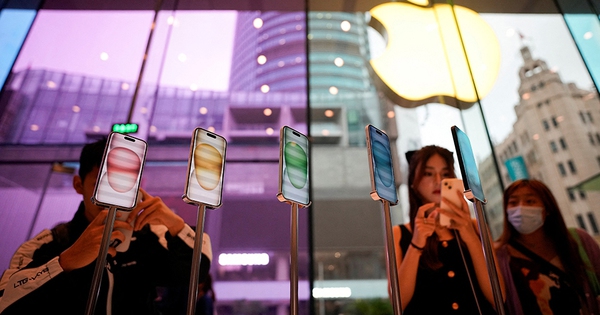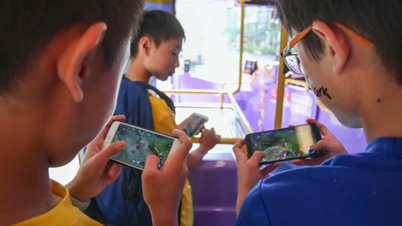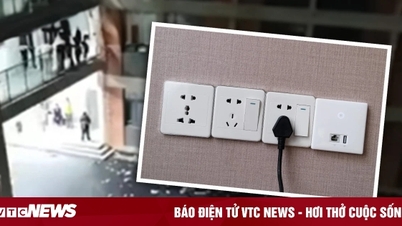
An 8th grade boy in Ho Chi Minh City is glued to games for nearly 6 hours a day - Photo: THUY CHI
This message also includes smartphone use.
There are mixed opinions about children being addicted to phones.
By the end of 2023, 60 education systems (30%) had enacted a ban on smartphones in schools in the form of law or policy. By the end of 2024, according to an update prepared by the GEM Report for the International Day of Education, 19 more education systems had implemented such a ban, bringing the total to 79 (40%).
These regulations are recorded in the PEER (Profiles Enhancing Education Reviews) system of GEM Report, a platform that tracks technology policies and laws in education around the world .
In some countries around the world, bans have become more stringent. In China, the city of Zhengzhou has tightened its ban on cell phones in primary and secondary schools, requiring parents to submit written consent if they want their children to use phones for legitimate educational purposes.
While there is widespread support for banning phones in schools, there are also dissenting opinions. Wu Hong, a researcher at the Dett Education Foundation in Chongqing, believes that solving the problem by “ordering young people to stop using their phones is not realistic”.
This researcher believes that instead of banning, schools should focus on cultivating students' self-management skills, teaching children to distinguish between the virtual world and the real world, which is good.
Another person, Ms. Liu Yanping, principal of Beijing National Day School, also believes that students should not be isolated from the Internet in the digital age. Children should discuss this issue with their parents and should be allowed to use their phones at certain times.
According to principal Liu Yanping, phones can affect eyesight and cause gaming addiction, but instead of just banning phones, state education authorities should reduce pressure on learning and performance.
Give students plenty of time to exercise , phones are not the first thing to blame.
However, the trend is increasingly popular in countries today to limit children's early use of phones, based on scientific surveys, especially in educational environments.
In France, in addition to the phone ban already in place at other levels of education, a "digital break" proposal has been put forward to extend to secondary school.
In contrast, in Saudi Arabia a ban on cell phones in schools was overturned after groups representing people with disabilities protested on medical grounds.
This policy tracker does not include all local areas in the federal states, although four areas are analysed in detail. For example, in Australia, of the nine states and territories, two, New South Wales and South Australia, have enacted phone bans in schools.
Or in Spain, 14 out of 17 autonomous communities have imposed a ban, with only the Basque Country, La Rioja and Navarre not yet in place.
In the US, 20 out of 50 states have enacted related regulations, including: the Cell Phone-Free Schools Act in California, a ban on cell phone use in kindergarten through 12th grade classrooms in Florida, a ban on students using wireless mobile devices in Indiana, and a similar ban in Ohio...
But in some states, regulations are only guidelines, leaving it up to schools to decide on specific policies. In Indiana, for example, school boards are required to develop and publicize their own policies that state whether students are allowed to use phones during lunch and how violations will be handled.
However, some places have flexibility instead of an absolute ban, typically Louisiana, an exception is applied to students with special learning support, while in Ohio, for those with health problems, they will need to monitor with mobile devices.
“We see children as young as nine asking for smartphones and they are clearly not emotionally mature enough to deal with the complexities of the digital world in each of these devices” (Rachel Harper, headteacher of St. Patrick’s Primary School, Greystones, County Wicklow, Ireland, who has banned smartphones in schools).

Many parents have consciously let their children study, read books and play sports instead of hugging their phones - Photo: THUY CHI
"Brain rot"?
Among the new words added to the Oxford English Dictionary in 2024 are “doomscrolling” and “brain-rot,” both symbols of unhealthy social media use fueled by artificial intelligence algorithms.
The 2023 GEM Report indicates that some types of technology devices can support learning in certain contexts but not when they are overused or misused.
Having a smartphone in class can disrupt the learning process.
A study of 14 countries, from preschool to university education, found that phones distract students.
Even if the phone is just sitting nearby and emitting notifications, it is enough to distract students from what they are doing.
Another study found that after being distracted, it can take students up to 20 minutes to return to their original state of focus.
Removing phones from schools in Belgium, Spain and the UK has been shown to improve academic performance, especially among students who perform worse than their classmates, according to research cited in the report.
The 2024 gender edition of the GEM report, titled “Technology: When Women Take the Lead,” also found that the practical use of technology often exacerbates extreme gender stereotypes.
Social media is particularly damaging to girls’ mental health and self-esteem. Cyberbullying is also becoming more common as students bring online devices to school, which is becoming increasingly worrying given the biased nature of artificial intelligence algorithms.
The GEM report calls for technology decisions in education to put the needs of learners first, ensuring that any technology used is purposeful, relevant, equitable, scalable and sustainable.
Instead of overprotecting them from technology, students need to understand both its benefits and its disadvantages.
At the same time, countries need to provide clearer guidance on what types of technology are allowed in schools and vice versa, along with responsible use. Only devices and types of technology that truly support learning should be allowed in schools.
Technology not only has negative impacts on learning, but also raises privacy concerns, as some apps collect more user data than is necessary to operate.
As of 2023, only 16% of countries will have laws ensuring data privacy in education.
Another analysis found that 89% of 163 education technology products recommended during the pandemic had the ability to track students.
Furthermore, 39 out of 42 governments that have provided online education during the pandemic have promoted forms of technology that risk violating children’s rights. (According to UNESCO)
************
The more real connections outside, the less virtual connections online. Parents need to know how to protect their children from the explosive digital age, from the negative information that is everywhere online. The story is right in Vietnam.
>> Next: Warning about the consequences of being neglected in children "addicted" to phones
Source: https://tuoitre.vn/tre-em-nghien-dien-thoai-ky-4-tranh-cai-ve-chiec-dien-thoai-va-tre-em-20250807101846832.htm



![[Photo] Brilliant red of the exhibition 95 years of the Party Flag lighting the way before the opening](https://vphoto.vietnam.vn/thumb/1200x675/vietnam/resource/IMAGE/2025/8/27/e19d957d17f649648ca14ce6cc4d8dd4)
![[Photo] Many people eagerly await the preliminary review despite heavy rain](https://vphoto.vietnam.vn/thumb/1200x675/vietnam/resource/IMAGE/2025/8/27/4dc782c65c1244b196890448bafa9b69)

![[Photo] Prime Minister Pham Minh Chinh chairs meeting of National Steering Committee on International Integration](https://vphoto.vietnam.vn/thumb/1200x675/vietnam/resource/IMAGE/2025/8/26/9d34a506f9fb42ac90a48179fc89abb3)

























































![[Photo] General Secretary To Lam attends Meeting with generations of National Assembly deputies](https://vphoto.vietnam.vn/thumb/402x226/vietnam/resource/IMAGE/2025/8/27/a79fc06e4aa744c9a4b7fa7dfef8a266)
































Comment (0)